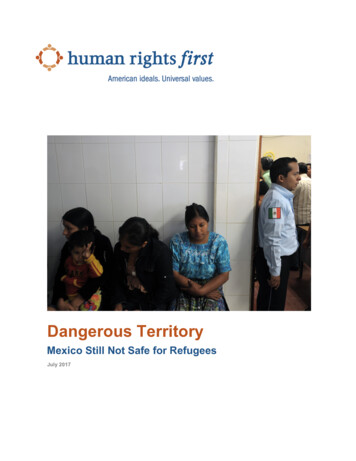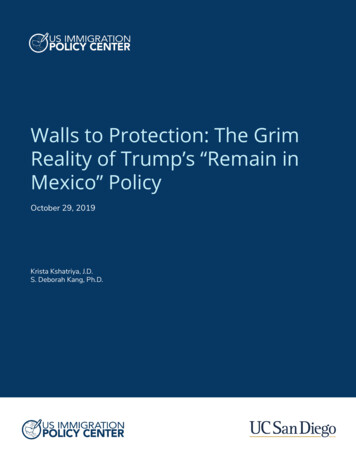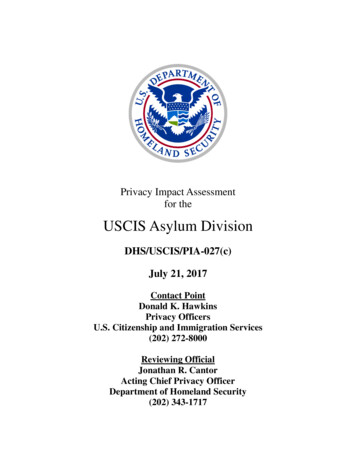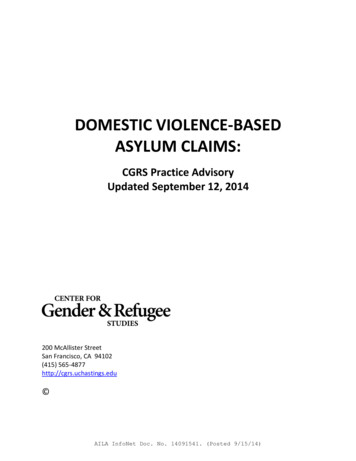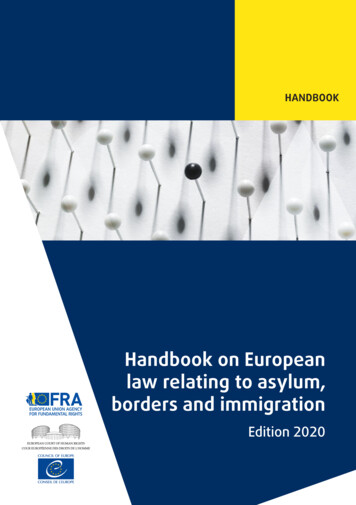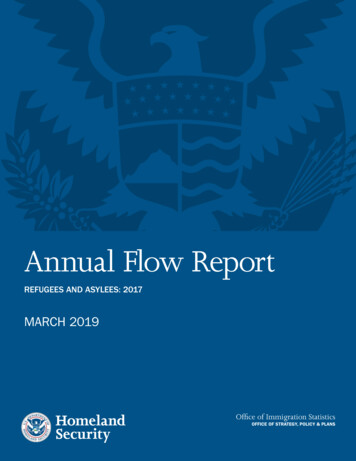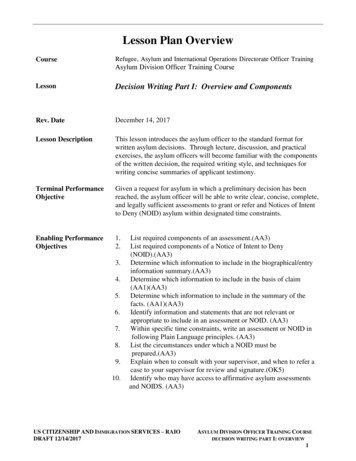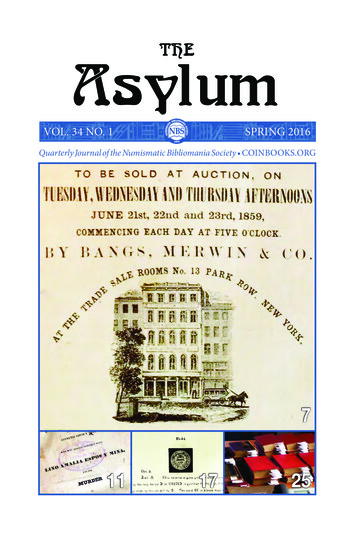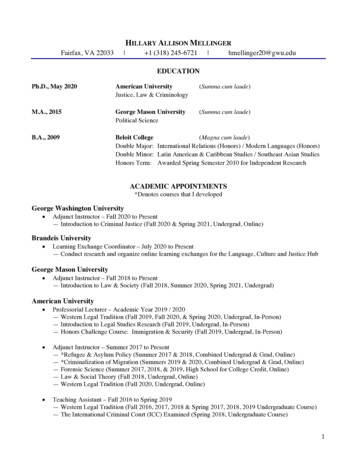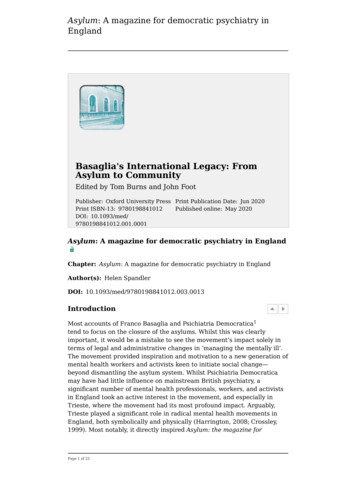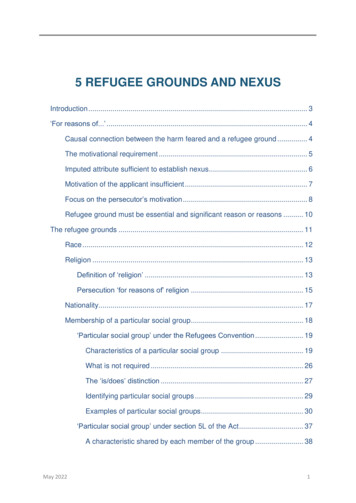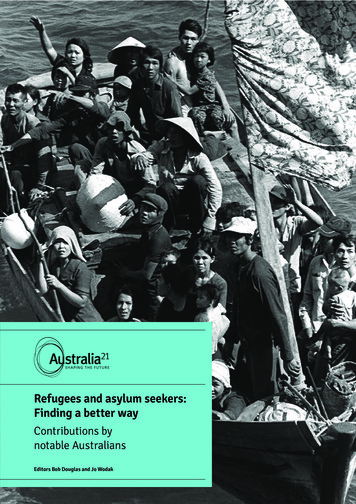
Transcription
Refugees and asylum seekers:Finding a better wayContributions bynotable AustraliansEditors Bob Douglas and Jo Wodak
ZOO 50188The essays in this volume express theviews of the individual authors and donot necessarily represent the viewsof Australia21.This volume is being widely distributedas a prelude to holding a roundtable ofstakeholders and policymakers in 2014,which will explore the feasibilityof bipartisan support for a freshAustralian approach to refugees andasylum seekers.iiRefugees and asylum seekers: Finding a better wayContributions by notable AustraliansEditors Bob Douglas and Jo WodakPublished December 2013Australia21 LimitedABN 25 096 242 010ACN 096 242 010Email: office@australia21.org.auWeb: www.australia21.org.auISBN 978-0-9873991-6-8
ContentsPreface. Bob Douglas and Jo Wodak2My name is Widyan: I am a refugee. Widyan Al Ubudy5Leading on protection. Jane McAdam11Election aftermath: Where to now on asylum seekers and refugees? John Menadue15Asylum seeking: Not a new problem, but needing new solutions. Chris Barrie19People like us: Personal reflections. Trevor Boucher23Asylum seekers: The broader policy context. Paul Barratt27Asylum-seeker drownings on Australia’s border protection watch: An issue of national decency. Tony Kevin 32Why we need an end to mandatory detention. Gillian Triggs38My brothers and sisters in boats. David Maxwell Gray42Boats: What to do? A practitioner’s viewpoint. Erika Feller45Collateral damage responses when policy causes harm. Louise Newman51Ethical issues in the asylum-seeker debate. Simon Longstaff56Both sides of politics are failing us and the asylum seekers: There is a better way. Julian Burnside.59Asylum seekers: Does our approach reflect our character? The lessons that must be learnt. Mick Palmer63A win-win welcome. Anne Kilcullen67Ten incremental steps to transform refugee protection in the Asia-Pacific region. Paul Power71Is there a fair, just and effective policy approach to asylum seekers? Frank Brennan75Beyond the magic bullet: Why the asylum-seeker problem is like the drug problem. Desmond Manderson80An inclusive vision. Arnold Zable85Who we are not is not who we are: Moving on from Australia’s exclusionary approach to citizenship.Kim Rubenstein and Jacqueline Field88Who’s jumping the queue? Fairness and the asylum-seeker debate. David Corlett92A place of refuge: Responses to international population movements. Arja Keski-Nummi96There is a better way. John Hewson101Why the need for a compassionate policy on refugees? Besmellah Rezaee105Acknowledgements111Contents1
Preface.Bob Douglasand Jo WodakEmeritus Professor Bob Douglas (left) AO is a retiredpublic health academic, who was a Founding Directorof Australia21 and its first Chair.Jo Wodak (right) works in the NSW criminal justicesystem primarily in the area of adult basic education.She has degrees in literature and the history andphilosophy of science.The current dilemmaThe essays in this volume are in response to Australia21’sinvitation to people who have been actively engaged invarious aspects of asylum-seeker policy to take a freshlook at the current dilemma in its global, regional aswell as national contexts, and suggest practical waysin which the Australian community might respond morehumanely, more sustainably and more responsibly to it.Contributions were sought from a wide range ofAustralians - legal experts, ex public servants andadvisers, international and local agency representatives,ethicists, church representatives, academics andresearchers, concerned members of the public,and refugees.In soliciting these contributions, Australia21 didnot prescribe any particular opinion or critique.However it is striking that not one of the contributorsexpresses support for either the Labor or the CoalitionGovernment’s position on and treatment of asylumseekers or their response to and representation of theproblem of asylum-seeking boat arrivals.2Preface. Bob Douglas and Jo WodakInstead there is a striking uniformity of view that currentpolicies are inhumane, uneconomic and unjustified interms of international, national and societal obligations,and that core values of fairness and compassion havebeen sacrificed for political expediency. In the processthere has been a demonisation of asylum seekersarriving by boat as opportunistic queue jumpersMany perspectives on Australia’s ‘asylum-seekerproblem’ are discussed in what follows. Some writersfocus on Australia’s ‘problem’ as grossly inflated incomparison with the global reality of tens of millionsof desperate people in flight from persecution, conflictand war, holed up in camps under usually miserableconditions with no hope of return. Some focus on ourpolicies of mandatory detention and off shore processingin relation to international law, various internationalagreements, and with respect to human rights. Somestress the need for regional strategies and cooperationif a sustainable solution is to be achieved that takes intoaccount the priorities and capacities of neighbouringcountries such as Nauru and Papua New Guinea as wellas Malaysia and Indonesia.
Others discuss the economic benefits especially to ruraland regional Australia of an approach which would allowcommunity placement and permit refugees to work whiletheir claims are assessed.These critiques and suggestions are important andshould be considered in a non-partisan spirit by theAustralian people. Through open discussion anddialogue and through allowing the voices of the refugeesthemselves to be heard, as well as the politicians, theexperts and the public, we can surely move towardsa solution that is both pragmatic and fairer to all.The global contextOf course the key underlying problem is that the worldis already overpopulated and our human numbers arestill growing. There is now a massive imbalance betweenthe carrying capacity of the planet and the demandswhich humans are making on it. The consequencesinclude a change in the climate and global temperature,a decline in arable land for the production of food,increasing inequality both within countries and betweenthem, wars over resources and access to land, oil andwater, and clashes between religious cultures.All of this is happening during the era of globalisation,with increasing communication and interdependencebetween what happens in one country and all of theothers. We are no longer an isolated independent State.We are part of a global community and Australia is nowa member of the United Nations Security Council.It is little wonder that as less fortunate societies thanours break down, the people forced to flee their homecountries will view Australia as the best option on offerand they will go to extreme lengths to get here.By nearly every parameter we can name, Australiaappears from the outside an oasis of space, peace andprosperity in a global sea of overcrowding and increasingtrouble. We have one of the highest standards of livingand life expectancies in the world, with about 0.3 percent of the world’s human population occupying about5 per cent of the world’s land mass (much of it admittedlyuninhabitable). We have survived better than any othernation the recent global financial crisis, have a stabledemocracy, and are free of wars and relatively free ofracial, religious and ethnic conflict.We live mainly in coastal cities and have lowunemployment rates and strong education participationrates. Our natural rate of population growth is smallbut our population is growing at one of the highestrates in the world because of an ingrained belief by thepeople who control our political and economic decisionsthat growth in the economy and population growththrough immigration will continue to be the answerto long-term prosperity, notwithstanding the hugebiophysical constraints that now operate in a world of7.1 billion humans.Immigration has unquestionably served Australia well inthe decades since the Second World War and our nationhas benefited enormously from the skills and culturaldiversity that immigrants, many of them refugees, havebrought to our shores.Elsewhere, unchecked human population and economicgrowth is almost certainly moving the world towardssome kind of civilisation collapse, probably withinthe lifetimes of our children or grandchildren. Even inspacious Australia we are already living well beyond oursustainable ecological means. The numbers of peoplewishing to relocate to Australia will almost certainlycontinue to climb massively in coming decades.Preface. Bob Douglas and Jo Wodak3
The need for a new approachIt is understandable that those of us who live herealready want to exercise control over ‘who comes to livein our country and on what terms’, to paraphrase JohnHoward’s highly effective election speech in 2001.Therein lies the dilemma. It is the reason that boatarrivals have become so politicised in recent years andwhy our major political parties have been engaged ina ‘race to the bottom’ in their determination to deterasylum seekers from paying people smugglers to takethe risk of crossing the seas in leaky boats.Asylum seekers are people like us who have been lessfortunate than we have been in their place of birth.They are part of the human family and fellow residentsof one overstretched planet. That being said, there is nosimple solution for dealing with this ongoing problemof more and more people in desperate circumstanceswanting to make Australia home.Our history has depended upon migrants, refugeesand convicts. In earlier periods we prided ourselves onegalitarianism and a fair go for the underdog. Currently,we admit about 200,000 migrants annually of whom13,750 enter under our humanitarian program. Wealso accept, preferentially under various migrationcategories, skilled people from developing countrieswhich can ill afford to lose them. And while we cannotaccommodate even a small fraction of the people whowill want to come here as problems elsewhere increase,there is a wide view in the community that we mustdevise a process that is fairer and more humane thanthe one we have been using in Australia in recent years.4Preface. Bob Douglas and Jo WodakHence this volume which seeks to broaden the nationalconversation beyond ‘stopping the boats’.The views expressed in these essays are the views ofthe individual authors and do not necessarily representthe views of Australia21, a non-profit body that seeks todevelop new insights into complex issues important toAustralia’s future. Our ambition in publishing them is togenerate a broader conversation in the community aboutmore humane possibilities.Our plan is that in 2014, after the release of this volume,Australia21 will be in a position to convene a roundtableof stakeholders and decision-makers to examine thefeasibility of a fresh new bipartisan approach.
My name is Widyan:I am a refugee.Widyan Al UbudyWidyan Al Ubudy is currently the radio host and producer forSBSPopAraby. When not on air, Widyan is also a Community EngagementProject Coordinator for the Community Relations Commission where sheworks with multicultural and multi-faith youth to maintain communityharmony and diversity across NSW. Widyan has just completed herhonours thesis on Muslim women media advocacy post 9/11 and iscurrently working on her first book based on the plight of refugees basedon her volunteer work at Villawood Detention Centre with a special focuson the refugee family she helped bring into Australia from Iraq.AbstractFor far too long we have become desensitisedto the cruel treatment of asylum seekers. The politicalpoint-scoring discourse of ‘boat people’, ‘queue-jumpers’and ‘illegals’ continues to propagate fear andhostility in the Australian mainstream communitytowards migrants. We have lost perspective on whothese people really are and what they have to offer.These so called ‘illegals’ have faces, names, families,hopes, dreams and aspirations just like you and me.It’s time we acknowledged them for who they are asfellow members of the human race. This is my storyof migration and one man’s desperate determinationto change his family’s life forever.Refugees are real peopleMy name is Widyan. I am a refugee. My parents wererefugees too. The difference is that I was born ina refugee camp and they weren’t.In my world, it is hard to imagine there being morethan one degree of separation between any one personand another who is not a refugee. Almost every one ofus, regardless of how ordinary we may seem, has anextraordinary story to tell. Many of the stories remainlocked up in distant memories or behind psychologicalbarriers built up over years - trying to put pain andsuffering out of mind. But the stories and the historyare there, regardless.My parents were born and bred in Iraq’s holy Shiite citiesof Karbala and Najaf. They were married in July 1983.At the time my father was a soldier, conscripted intothe Iraqi army, and serving as a communications officerin the war that was taking place with Iran at that time.When Saddam Hussein invaded Kuwait both my motherand father knew it was inevitable that my father wouldbe called up to join the army again.They made the heart-wrenching decision to leave thecountry that had been their home for generation aftergeneration of their forebears and to leave their extendedfamily, perhaps never to see them again. One night asthe sound of gunshots and artillery fire echoed acrossMy name is Widyan: I am a refugee. Widyan Al Ubudy5
Najaf, my mother, heavily pregnant with me, alongwith my father and my three older siblings, secretlytravelled to the border of Iraq and then crossed intoSaudi Arabia. Their escape from Saddam Hussein’sregime changed the course of my family’s life forever.We stopped being citizens and instead became statistics.We became refugees.Rafha is in the north of Saudi Arabia. It is desolate.The dusty orange terrain merges into crystal clear, blueskies. As the sea of ragged tents meets your gaze yourealise that the refugee encampment stretches beyondthe horizon. The tents have been home for hundreds ofthousands of Iraqi refugees now for more than 20 yearsof Middle East wars. Those tents provided the first roofover my head - if you could call it that. That was where,two months after my family arrived in Saudi Arabia,I was born. It was July 1991.The occupants of Rafha’s infamous refugee camp arereferred to by the Saudi authorities as ‘guests’ ratherthan refugees. This means that they are technicallynot entitled to any of the legal protections that areguaranteed by international law to refugees. Living inRafha wasn’t easy for my family. Constant dust storms,searing heat, the inability to get a job and the threat ofnever working again, together with the responsibility ofcaring for and educating four young children, was liketorture for my parents. Nevertheless, we survived theordeal. For five years my family, along with about 5,000other Iraqis, eked out an existence thanks to food rationsprovided by the Saudi Government. Every two days myparents received food that would last us for exactly twodays, and every three months they would receive 100dollars in cash, distributed to every refugee family by theSaudi Government. It was nowhere near enough to carefor a growing family, but it helped us make it through.6My name is Widyan: I am a refugee. Widyan Al UbudyIn early 1995 a group of Australian humanitarian workerswho specialised in helping identify refugees eligiblefor migration visited Rafha. My family was one of thosefortunate enough to be interviewed. After a few monthsof waiting, my parents were told that we qualified.We would be able to settle in Australia.We found ourselves flying across the world, headingtothe place that would become our new home: Sydney,Australia. My parents eventually found a house for usto live in. It was in Auburn. My mother and father werehappy for the family to finally be safe and sound, butdevastated to be so far away from their brothers andsisters and uncles and aunts, and from the countrythat still runs through their blood. Iraqis are incrediblypassionate about their families, their culture and theirhistory. It seemed to them that Sydney airport, and thesight of departing planes, would be the closest theywould get to their lifelong friends, and their brothers,sisters, aunts and uncles - for the rest of their lives.By 1999 my father had saved enough money from hisjob as a mechanic to put down a deposit on a brick housethat overlooked the local public school. The house wasjust big enough to accommodate our growing family.There were now six of us kids: me, three sisters and mytwo brothers.Now thirteen years later we still live in thatmedium-sized brick house, twenty minutes from Auburn,overlooking Smithfield public school. The house has anextra room or two that it didn’t have when we first movedin. There isn’t a day that goes by when I don’t rememberthe struggle that my parents and I went through to livethe life we now do.
When I see the plight of asylum seekers, maybe itresonates for me in a more personal way because of mypersonal history, but I feel sure that anyone with thesmallest amount of human feeling and emotion will feelsome vestige of empathy if they read just one story ofjust one person. So I want to share with you a story andhopefully this story will resonate with you. You might nothave lived through the experience of these people, youmight not have felt what they have felt, but remember,the only thing that separates you from them is that youwere born in a different country to them, you come froma different race and probably have a different religion.This then is my perspective on asylum seekers. You won’tfind this story in the news. You won’t hear it at pressconferences. You won’t hear the politicians telling youabout the lives of these human beings, because they hateto allow things to become personal. The politicians andthe shock jocks keep telling us why our armed forceswere and are in Iraq or Afghanistan, to liberate thepeople from their oppressive Governments. The refugeesfrom Iraq and Afghanistan just want to be free, but somepeople are freer than others.I walked through the metal detector and past the securitydoors and through a gated barbed wire fence. I clutchedat my security wristband. It told me that I was number35. As I entered for the first time, I knew I was about toexperience something that few people who talk aboutrefugees actually experience. I was about to find outwhat it feels like to be on the inside of one of the mostnotorious detention centres in the country - Villawood.One man was standing in a corner with his eyes castdown on the floor in front of him. He didn’t seem to wantto communicate with anyone and clearly didn’t want tomake eye contact. I wondered whether he would considertalking to me. I cautiously approached him and startedby asking where he had come from. Without altering hisdownward gaze he told me that he was from Iraq.I told him that I too was an Iraqi, even though I hadactually never set foot on Iraqi soil. He looked up and fora moment his brown eyes flickered as he briefly lookedinto my eyes. It was as if a flashlight was struggling tocome to life. Finally the light came on. He raised his headand then made proper eye contact. I found myself beingushered to a nearby seat.Immediately he began to talk. ‘My name is Jamil,’ he said.‘Why are you here? I mean, how did you end up here?’He smiled and sighed and said, ‘Where do I begin?’Jamil began to talk quietly and passionately. He toldme how he missed his home. ‘I have been here for overtwo years. I remember being there, before being here:the days when you could feel safe in Iraq, when my wifecould go out at night and visit her friends, when mychildren could go to school – without us fearing for theirsafety,’ he reminisced. ‘Now my country is destroyed andI’m trying to find a place where my family can be safe.’My name is Widyan: I am a refugee. Widyan Al Ubudy7
The 2003 invasion was not alone in bringing aboutsectarian conflict, but it was concurrent with over4 million Iraqis becoming instantaneous refugees.Many now reside in Jordan and Syria while others,like Jamil, fled without papers. They went to Australia,the US, the UK and Canada. Many experts suggestthat since 2007-08, the peak of the war, the number ofdisplaced Iraqis has reached well over 4 million. This isthe highest number of refugees the Arab world has seensince the 1948 Palestinian exodus. The United NationsHigh Commissioner for Refugees (UNHCR), which hasworked for over 50 years in humanitarian aid work andthe processing of refugees, stated that ‘the magnitudeof this crisis is staggering’. In 2007 Iraqi refugees facedextreme hardship, with many forced to live at the marginof survival, just like Jamil.Jamil’s story was perhaps indicative of many. ‘One dayI returned home and found a paper on the door. It read,The blood of the owner of this house is needed! I wascertain that they were rebels who had left me a messageand had previously worked for the former Governmentwho had arrested me for a few days for not complyingto fight alongside them. I actually was quite rich beforethe war, I owned my home. I had a thriving business and afamily.’ He looked at his hands and shook his head. ‘Whenyou read something like that message, you don’t have anyother choice but to try to take your family to safety. Yourfamily’s safety is something you can’t compromise.’Jamil decided to flee the country and seek refuge inAustralia after moving his family to a different city. Hetold me about some of his travails as a refugee, tellingme how he rescued a man from the sea when their boatcapsized on the way to Christmas Island. ‘The fear in allof us was indescribable. I saw a young guy who was reallystruggling, who clearly didn’t know how to swim. He wasnear me, so I swam over to him to try to help. I grabbed8My name is Widyan: I am a refugee. Widyan Al Ubudyhis shirt and got his head above water. I managed to gethim to where some pieces of wreckage from the boatwere floating. We both held on until we were both saved!We looked death right in the eye that day. When yougo through something like that you remember why yourisked your life, although it’s scary you realise that therisk is still worth it to come here.’As an Australian who had herself been born a refugeeI had to ask myself, Was Jamil incredibly brave orunbelievably foolhardy?. It made me think of how patientand disciplined my own father and mother had been, andit made me wonder at what point my own father wouldhave broken, and become another Jamil. My reflectionswere interrupted by Jamil. ‘I’m still here. It’s hard to wakeup in the morning knowing I am in jail separated from theworld and from life by razor wire as if I have committedthe worst offence imaginable.’Jamil told me how he had used most of his life savingsto pay a people smuggler to get him out of Iraq. He toldme of the additional money his wife had spent to getthe documentation evidence to prove his story to thecase manager appointed by the Australian Government.I thought about the concept of people smugglers andtheir role in the life of refugees like Jamil. Along with‘boat people’, ‘people smugglers’ is a phrase at theforefront of the media’s attention. They are describedas the worst kind of criminals. But aren’t they justanother manifestation of what happens when you breakobligations under International law? For people likeJamil, they are essentially lifesavers.
Taking a pragmatic view, the reality is that peoplesmugglers are assisting refugees in a fight for abetter future. People like Jamil are willing to sacrificeeverything to ensure the protection of their families.Rather than realising this reality, it seems as if Australiais lost in a political conundrum where the fear of being‘inundated with refugees’ is producing a mentalitythat has become an illness that cripples our minds andhardens hearts. We lose our sense of compassion forthem and we lose it for each other too.‘I feel like I’m fighting a lost cause. This country hasa reputation for being good to global citizens.’ Globalcitizen, I thought. Yes, this man was a global citizen,a citizen that a developed first world nation like Australiahas a human rights responsibility to help, consideringAustralia’s contribution to the plight of Jamil’s country.After all, I thought, regardless of how Australia might betrying to contribute to the peace, first it contributed tothe war.As I looked at his weary face, his eyes silently pleadedto me in a way that I was powerless to respond to.I asked Jamil why he chose Australia as his destination.He smiled and shook his head. ‘Someone once toldme this country is free, just and fair. I’m starting tothink that person was crazy.’Of course, Australia is all those things when you arehere, but when you come by boat the authorities forgetall too often their legal responsibilities. The mediaadopts a simplistic view of this incredibly complex topic,and this leads directly to racial dissonance.Asylum seekers do not opt for the boat option becauseit is the inexpensive way to travel – not at the going rateof 5,000 to 10,000 per person. The reason why thesepeople risk their life and future is simple, they have beengiven no other choice. They could quite possibly affordto come by plane, but that would require formal traveldocumentation. Formal documentation is something thatthe country they are escaping persecution from is notwilling to grant them, as Jamil is discovering.Courtesy of the Government and the media’s pettyobsession with boat people, those who arrive by planego almost unnoticed. The 2010-11 Asylum Trends reportreleased by the Immigration Department stated thatonly 30 per cent of Chinese asylum seeker claims and8 per cent of those made by Indians were accepted, themajority of whom arrived by plane. The largest numberof nationals that qualified as genuine refugees accordingto the Australian Government and who were acceptedwere Afghans, reaching 89 per cent acceptance rate in2011. For Iraqis the success rate was 90 per cent and forIranians 94 per cent. These figures speak volumes butyet are not reflected in the Villawood detention centrebecause it is Afghani, Iraqi and Iranian refugees whoremain locked up, and treated as criminals.This stark contrast between government figures and theharsh reality is a contradiction in Australia’s legal systemand an illustration that this country’s failure to complywith basic human rights is costing people their freedom,time, sanity and sometimes life.My name is Widyan: I am a refugee. Widyan Al Ubudy9
In August 2012, Jamil was released from the Villawooddetention centre. He was given legitimate refugeestatus. I realised that the only thing that was going totruly make Jamil happy was for his family to be by hisside so that he could start his life over. After his release,Jamil and I faced a one-year battle to bring his familyto Australia. After countless meetings, presentingvarious documents, thousands of dollars and even Jamilreturning to Iraq, he and I were successful in bringinghis family to Australia. It’s been two months sincethey settled in Sydney. Although they continue to facehardship, Jamil had finally proved that he was genuinein his quest for the search of a better life for his children.He had proved the Australian general public wrong.Jamil’s story, until this day, remains with me. Maybe it’sbecause he is Iraqi like me. Or maybe it’s because he isa refugee and I was one too. But when I think of Jamil,and he speaks of his family, it’s as if I am hearing myown father telling us our story of migration to Australia.I know my father did everything in his power, along withmy mother, to ensure our safe arrival to Australia. LikeJamil my father knows all too well what it’s like to leaveyour native country while it is at war. He wanted to savehis family from poverty and corruption in hope of a betterlife. That is all Jamil wanted too. It’s a feeling that willremain with Jamil, my father and with me, forever.10My name is Widyan: I am a refugee. Widyan Al UbudyThe Universal Declaration of Human Rights states underarticle 1 that all human beings are born free and equalin dignity and rights. Article number 4 states everyonehas the right to life, liberty and security of person.Article number 5 states no one shall be subjected totorture or to cruel, inhuman or degrading treatmentor punishment. Article 9 states that no one shall besubjected to arbitrary arrest, detention or exile. Andfinally article number 14, section 1, says that everyonehas the right to seek, and to enjoy in other countries,asylum from persecution. These are just some of therights Australia is party to, and if we don’t honour ouragreement then the only logical conclusion is that weare breaching them. It is an irony that makes me realisethat by telling these refugee stories I can hold up myhead and be proud that I am calling those in authorityto account, so that we can all remember that we haveto earn the right to be proud to be called an Australian.It is not automatic.
Leading on protection.Jane McAdamJane McAdam is Scientia Professor of Law and the Founding Director ofthe Andrew & Renata Kaldor Centre for International Refugee Law at theUniversity of New South Wales. She holds an Australian Research CouncilFuture Fellowship, and is a non-resident Senior Fellow at The BrookingsInstitution in Washington DC and a Research Associate at the Universityof Oxford’s Refugee Studies Centre. Professor McAdam serves on anumber of international committees and has undertaken consultancies forUNHCR and various Governments on issues relating to forced migrationand international law.AbstractHow do we create an asylum policy that reflectsAustralia’s international legal obligations and isacceptable to the general public? This essay arguesthat strong, ethical leadership can shape andshift ideas by educating the community about thecomplexities of forced migration, and appealing to theAustralian ideal
Asylum seeking: Not a new problem, but needing new solutions. Chris Barrie 19 People like us: Personal reflections. Trevor Boucher 23 Asylum seekers: The broader policy context. Paul Barratt 27 Asylum-seeker drownings on Australia's border protection watch: An issue of national decency. Tony Kevin 32 Why we need an end to mandatory detention.
